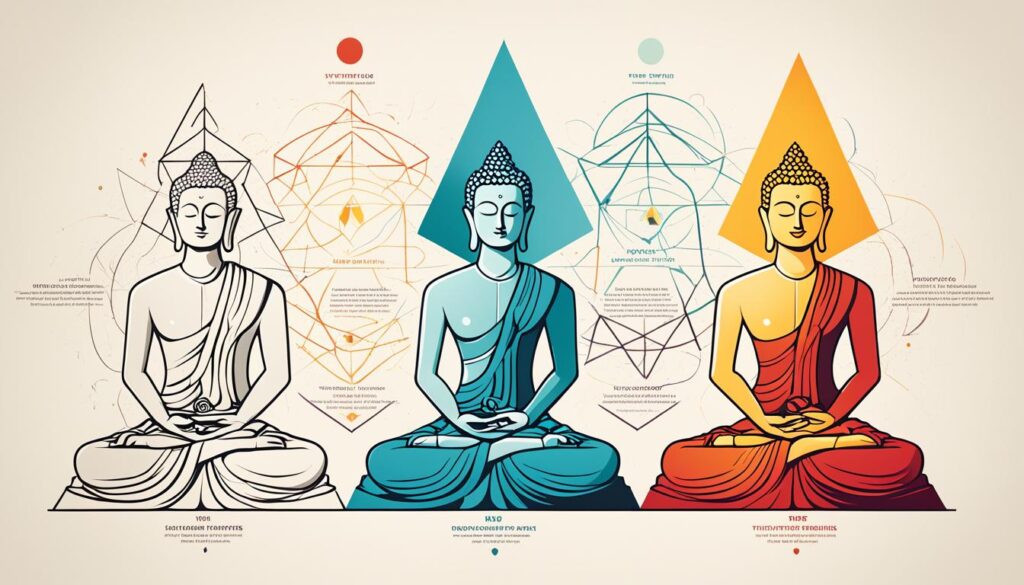“Thousands of candles can be lighted from a single candle, and the life of the candle will not be shortened. Happiness never decreases by being shared.” – Buddha
Welcome to the enlightening journey of Buddhism, where the pursuit of spiritual awakening and achieving enlightenment is at the heart of the path. Buddhism offers teachings and practices that can guide you towards personal and societal harmony, addressing the challenges of modern life. By understanding the path to enlightenment in Buddhism, you can embark on a transformative journey that leads to inner peace, wisdom, and liberation.
Key Takeaways:
- Follow the Eightfold Path to progress towards spiritual awakening and enlightenment.
- The Four Noble Truths highlight the nature of suffering and the path to its cessation.
- Mindfulness plays a central role as the key to achieving enlightenment.
- Karma influences the cycle of rebirth and offers opportunities for growth and liberation.
- Embark on the path to enlightenment in Buddhism for personal and societal harmony.
The Eightfold Path in Buddhism
The Eightfold Path is a vital concept in Buddhism that guides practitioners on the steps to achieving enlightenment. This path was first introduced by the Buddha in his inaugural sermon after attaining enlightenment. It emphasizes the middle way, striking a balance between asceticism and sensual indulgence.
The Eightfold Path comprises eight elements, each playing a crucial role in developing a wholesome and enlightened mindset. These elements are:
- Correct View: Understanding the Four Noble Truths.
- Correct Intention: Cultivating positive intentions.
- Correct Speech: Practicing ethical communication.
- Correct Action: Engaging in ethical conduct.
- Correct Livelihood: Pursuing a livelihood aligned with moral principles.
- Correct Effort: Abandoning negative states of mind and nurturing positive ones.
- Correct Mindfulness: Cultivating awareness of the body, feelings, thoughts, and phenomena.
- Correct Concentration: Cultivating single-mindedness and focused awareness.
By following these steps, individuals can progress on the path towards achieving spiritual awakening and experiencing enlightenment. The Eightfold Path provides a comprehensive framework for personal growth and transformation, offering practical guidance for living a mindful and ethical life.
Mindfulness and the Eightfold Path
Mindfulness, a key practice in Buddhism, is closely intertwined with the Eightfold Path. It involves being fully present and aware of one’s thoughts, emotions, and physical sensations without judgment or attachment. By cultivating mindfulness, practitioners enhance their ability to embrace the Eightfold Path and deepen their spiritual journey.

| Element | Description |
|---|---|
| Correct View | Understanding the Four Noble Truths |
| Correct Intention | Cultivating positive intentions |
| Correct Speech | Practicing ethical communication |
| Correct Action | Engaging in ethical conduct |
| Correct Livelihood | Pursuing a livelihood aligned with moral principles |
| Correct Effort | Abandoning negative states of mind and nurturing positive ones |
| Correct Mindfulness | Cultivating awareness of the body, feelings, thoughts, and phenomena |
| Correct Concentration | Cultivating single-mindedness and focused awareness |
The Four Noble Truths in Buddhism
The Four Noble Truths are fundamental teachings in Buddhism that revolve around the nature of suffering and offer a path to its cessation. These truths provide deep insights into the human condition and guide individuals towards inner peace and enlightenment.
The First Noble Truth: Acknowledging Suffering
The first truth recognizes the existence of suffering, which extends beyond physical pain and includes mental anguish and dissatisfaction. It invites us to reflect on the universal truth that life is inherently unsatisfactory and transient. By acknowledging this truth, we can develop a realistic perspective and cultivate compassion towards others who are also bound by the same predicament.
The Second Noble Truth: Identifying the Causes of Suffering
The second truth identifies desire and ignorance as the root causes of suffering. The relentless pursuit of pleasure, attachment to material possessions, and the illusion of an enduring self perpetuate our suffering. Ignorance, manifested as the inability to see the true nature of things, further fuels our dissatisfaction. By becoming aware of these causes, we can begin to break free from their grip and find liberation.
The Third Noble Truth: Discovering the Cessation of Suffering
The third truth offers hope and presents the possibility of freedom from suffering. It encourages us to recognize that suffering can come to an end, both in this lifetime and through the attainment of Nirvana. Nirvana is the state of enlightenment and liberation from the cycle of birth and rebirth. It represents the ultimate freedom from suffering, allowing individuals to experience profound peace and serenity.
The Fourth Noble Truth: Embracing the Path to the Cessation of Suffering
The fourth truth reveals the Noble Eightfold Path as the way to end suffering and attain enlightenment. This path consists of eight interrelated aspects: right view, right intention, right speech, right action, right livelihood, right effort, right mindfulness, and right concentration. By cultivating understanding, ethical conduct, mental development, and wisdom through these aspects, individuals can traverse the path towards inner peace and ultimate liberation.

Through the Four Noble Truths, Buddhism provides a profound understanding of the human experience and offers guidance on how to overcome suffering and achieve true happiness. By embracing these truths and following the Noble Eightfold Path, individuals can embark on a transformative journey towards inner peace, wisdom, and the realization of their full potential.
| Noble Truth | Description |
|---|---|
| The First Noble Truth | Acknowledges the existence of suffering in physical and mental forms. |
| The Second Noble Truth | Identifies desire and ignorance as root causes of suffering. |
| The Third Noble Truth | Offers hope by suggesting that suffering can come to an end through achieving Nirvana. |
| The Fourth Noble Truth | Reveals the Noble Eightfold Path as the way to end suffering and attain enlightenment. |
Mindfulness as the Key to Enlightenment
Mindfulness is a central aspect of Buddhism, serving as the key to achieving enlightenment. It involves being fully present and aware of your thoughts, emotions, and physical sensations, without judgment or attachment. Through mindfulness practices, such as buddhist meditation techniques, you can develop focused attention and cultivate awareness.
By practicing mindfulness, you can observe the true nature of your thoughts, feelings, and sensations. This practice allows you to gradually transcend the conditioned reality that often limits our perception. It is through mindfulness that you can experience the Absolute Truth and gain wisdom beyond conditioning.
Mindfulness is not something that can be attained through volitional actions alone. It requires a deep understanding and a dedicated practice. It is the direct path to freeing yourself from the world of conditioned reality and seeing things as they truly are.

The Benefits of Mindfulness Practices
The practice of mindfulness in Buddhism offers numerous benefits for spiritual growth and achieving enlightenment. Here are some of the key benefits:
- Improved Focus and Concentration: Mindfulness practices help sharpen your attention and enhance your ability to concentrate on the present moment.
- Reduced Stress and Anxiety: Mindfulness allows you to enter a state of calm and tranquility by cultivating awareness and acceptance of the present moment.
- Enhanced Emotional Well-being: By being mindful, you can develop emotional resilience and gain a deeper understanding of your emotions, leading to greater emotional balance.
- Heightened Self-Awareness: Mindfulness practices enable you to develop a deeper understanding of yourself, including your thoughts, patterns of behavior, and beliefs.
- Increased Compassion and Empathy: Through mindfulness, you develop a sense of interconnectedness with others, leading to greater compassion, empathy, and kindness.
Mindfulness practices are a transformative tool on the path to enlightenment in Buddhism. By incorporating these practices into your daily life, you can cultivate a deeper sense of self-awareness, wisdom, and compassion.
Mindfulness Practices for Enlightenment
| Mindfulness Technique | Description |
|---|---|
| Breath Awareness | Focus your attention on your breath, observing its sensation without judgment. This technique helps cultivate present-moment awareness. |
| Body Scan | Systematically scan your body from head to toe, noticing any physical sensations or areas of tension. This practice enhances body awareness and relaxation. |
| Walking Meditation | Engage in mindful walking, paying attention to the sensations in your feet, legs, and body as you move. This technique combines physical movement with mindfulness practice. |
| Loving-Kindness Meditation | Cultivate feelings of love, compassion, and kindness towards yourself and others by repeating affirmations or visualizing positive interactions. |
| Observing Thoughts and Emotions | Observe your thoughts and emotions as they arise and pass away, without getting caught up in them. This practice cultivates non-attachment and creates space for greater clarity. |
Karma and the Cycle of Rebirth in Buddhism
In Buddhism, karma plays a vital role in understanding the path to spiritual awakening and attaining nirvana. Karma refers to the actions individuals take during their lifetime and the consequences that result from those actions.
Every action, whether good or bad, has a ripple effect that extends beyond its immediate impact. Good actions, such as acts of generosity and righteousness, create positive karma and lead to happiness in the long run. Conversely, bad actions, such as lying or killing, generate negative karma and bring about unhappiness.
Karma is not predetermined fate; instead, it is a result of intentional actions. It is influenced by five conditions: frequency, intention, remorse, the status of the person involved, and gratitude towards others. These conditions shape the karmic consequences of our actions.
Karma also plays a crucial role in the cycle of rebirth, also known as samsara. According to Buddhist beliefs, individuals can be reborn into six separate realms based on their karmic accumulation. These realms include the human realm, heavenly realm, animal realm, ghost realm, hell realm, and the realm of demi-gods. Each realm offers different experiences and challenges.
While it is possible to be reborn into various realms, being reborn as a human is considered a precious opportunity for spiritual awakening and enlightenment. The human realm is seen as a favorable realm for progress on the path to nirvana.
As humans, we possess the capacity for moral reasoning, self-awareness, and the ability to cultivate wisdom. These qualities make it possible to understand the nature of suffering and liberation from it. The human realm provides us with the space to engage in practices that lead to personal and spiritual growth, ultimately leading to the attainment of nirvana.
If we fail to utilize this opportunity and waste our human existence, we may be reborn into other realms where spiritual progress becomes more challenging. Therefore, being reborn as a human is a precious chance that should not be taken for granted.

Conclusion
The path to enlightenment in Buddhism is a profound journey that offers individuals the opportunity for spiritual growth, inner peace, and awakening. By following the Eightfold Path and embracing the Four Noble Truths, one can embark on a transformative path towards achieving enlightenment.
Through mindful practice and the cultivation of ethical conduct, individuals can progress on the path to enlightenment. By developing a correct view, intention, speech, action, livelihood, effort, mindfulness, and concentration, one can gain a deeper understanding of the nature of reality and cultivate wisdom.
Mindfulness practices, such as meditation techniques, are vital for achieving spiritual awakening. By being fully present and aware of one’s thoughts, emotions, and sensations, individuals can transcend conditioned reality and experience the Absolute Truth. Mindfulness allows for a deeper connection with oneself and the world around, leading to a profound sense of inner peace.
Karma, the consequences of our actions, plays a significant role in our spiritual journey. By understanding and embracing karma, individuals can shape their destiny and seize opportunities for growth and liberation. By walking the path to enlightenment, one can strive for personal and societal harmony, addressing modern challenges and experiencing the profound teachings and wisdom found in Buddhism.
FAQ
How can I achieve enlightenment in Buddhism?
Achieving enlightenment in Buddhism requires mindful practice and understanding. By following the Eightfold Path, cultivating ethical conduct, mental clarity, and wisdom, you can make progress towards spiritual awakening and experiencing inner peace.
What is the Eightfold Path in Buddhism?
The Eightfold Path is a foundational concept in Buddhism that outlines the steps to achieving enlightenment. It consists of eight elements, including correct view, intention, speech, action, livelihood, effort, mindfulness, and concentration. Each element plays a crucial role in developing a wholesome and enlightened mindset.
What are the Four Noble Truths in Buddhism?
The Four Noble Truths are fundamental teachings in Buddhism that highlight the nature of suffering and the path to its cessation. They acknowledge the existence of suffering, identify desire and ignorance as its root causes, offer hope for its end and liberation from the cycle of rebirth, and reveal the Noble Eightfold Path as the way to end suffering and attain inner peace.
How does mindfulness contribute to enlightenment in Buddhism?
Mindfulness plays a central role in Buddhism as the key to achieving enlightenment. Through mindfulness practices and various meditation techniques, individuals can develop focused attention and cultivate awareness. This enables them to observe the true nature of thoughts, feelings, and sensations, gradually transcending conditioned reality and experiencing the Absolute Truth.
What is karma in Buddhism?
In Buddhism, karma refers to the actions a person takes during their lifetime and the consequences of those actions. Good actions lead to happiness, while bad actions bring about unhappiness. Karma is not predetermined fate but rather a result of intentional actions influenced by various conditions. It also plays a role in the cycle of rebirth, offering opportunities for spiritual awakening and enlightenment.
What is the significance of the path to enlightenment in Buddhism?
The path to enlightenment in Buddhism is a transformative journey that offers teachings and practices for personal and societal harmony. By embracing the wisdom of the Buddha, individuals can address modern challenges, cultivate inner peace, and strive for spiritual growth and awakening.

